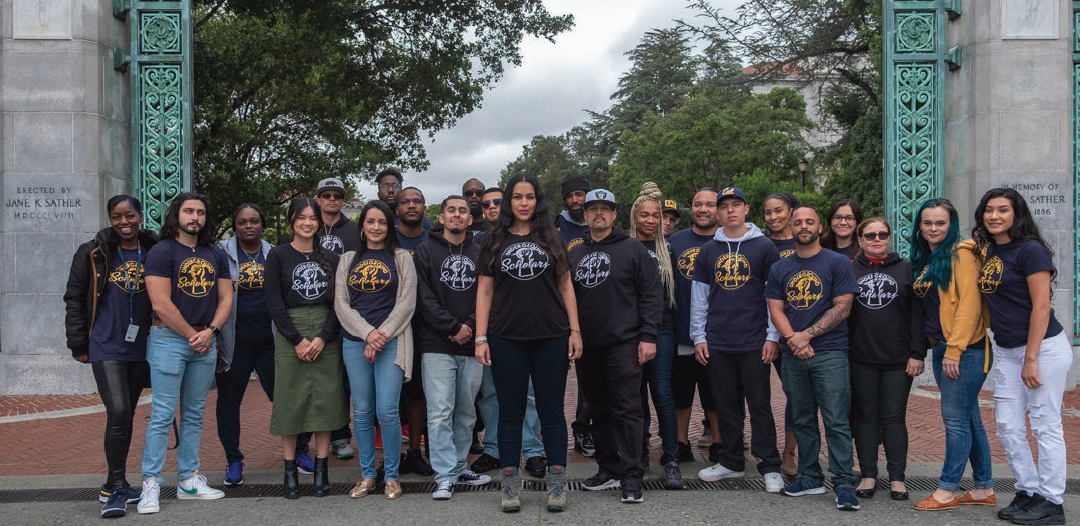Approximately 95% of people in prison will eventually be released, and nothing improves reentry success like higher education. Not only does this academic achievement reduce recidivism, it opens pathways to increased economic prosperity and improved well-being. Investing in higher education for currently and formerly incarcerated scholars is, quite literally, smart justice.
In 2020, Michelson 20MM Foundation awarded the Campaign for College Opportunity a Smart Justice Spark Grant to collect data on current and formerly incarcerated students to advance our understanding of their unique needs, experiences, and supports. Earlier this year, the organization released its research in The Possibility Report: From Prison to College Degrees in California.
According to the findings, California incarcerates nearly one-quarter million people and has nearly half a million individuals on probation and parole. As of June 2020, there were 11,472 students enrolled in a face-to-face or correspondence program in California state prisons. It’s estimated that over 1,000 formerly incarcerated students are studying at public institutions. In all, roughly 3% of the state’s justice-involved individuals are accessing critical higher education.
The Possibility Report highlights the state’s racial equity imperative for investing in higher education given that California’s history of “tough on crime” policies accelerated the mass incarceration of Black and Latinx communities. The report states, “While we work to dismantle a racist criminal ‘justice’ system, we must simultaneously work to create anti-racist policies that facilitate educational opportunity and college degree attainment for incarcerated and formerly incarcerated Californians.”
The Campaign for College Opportunity found that inconsistent services, messages, and policies work against the success of justice-involved Californians. Student focus groups with formerly incarcerated scholars revealed five common themes:
- The parole and probation systems in California do not prioritize higher education and often prevent formerly incarcerated Californians from achieving their educational goals.
- Requirements to access housing leave formerly incarcerated Californians with unstable living situations, creating environments not conducive to attending college.
- Formerly incarcerated students straddle two employment problems: finding work and balancing work with school.
- Targeted student support services are key to college retention but are inconsistent across campuses.
- Campus advisors lack the specific knowledge and understanding to properly advise students with criminal records on career opportunities.
Finally, the Possibility Report leaves us with several policy recommendations across each of these five key themes that would advance and support student success.
- Parole and Probation: The state should establish guidelines that require parole/probation officers to promote higher education and treat both part-time and full-time enrollment as equivalent to securing a job when meeting parole/probation requirements.
- Housing: Enrollment in higher education should allow for transitional and affordable housing sponsored by the county or state. Public colleges should clearly communicate any requirements for on-campus living to those that are formerly incarcerated and ensure support staff are available to answer questions.
- Employment: Ensure that all colleges comply with California’s Fair Chance Hiring policy. Public colleges should prioritize formerly incarcerated students for Federal Work-Study opportunities and significantly expand Federal Work-Study opportunities. Public colleges should train staff to better serve formerly incarcerated students seeking job opportunities and resources on campus.
- Targeted Student Support: Correctional facilities and public colleges should start the college-going process while students are still incarcerated. Utilize the current Adult Reentry Grant Program to support a prison to college transition effort.
- Career Transition: Public colleges should ensure that academic and career counselors have appropriate training to support formerly incarcerated students with their major selection and career aspirations.
Possibility Report author, Danny Murillo says, “My life’s work is to ensure incarcerated, and formerly incarcerated people have the opportunity to turn their lives around through education. My most significant accomplishment was breaking the cycles of incarceration in my family and helping my brother and nephew create their path towards success… In this report, we uplift the voices of formerly incarcerated students in California’s public colleges and universities who candidly and vulnerably discuss the real challenges they have encountered in their transition from incarceration to a college or university campus. I am in awe and inspired by the real opportunity we have as a state to create change for generations of Californians caught in an unjust criminal ‘justice’ system. For far too long, California has overinvested in prisons to solve our social issues, but has provided minimal resources or funding to colleges and universities to provide an alternative to incarceration. It is time to change that, and I am living proof that the investment works!”
Michelson 20MM was founded thanks to the generous support of renowned spinal surgeon and inventor Dr. Gary K. Michelson and his wife, Alya Michelson. The Michelson 20MM Foundation is dedicated to supporting and investing in leading organizations, technologies, and initiatives that seek to transform learning and improve access to educational opportunities that lead to a meaningful career. Learn more at www.20mm.org.

